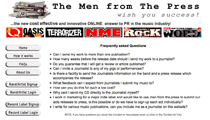This website uses cookies so that we can provide you with the best user experience possible. Cookie information is stored in your browser and performs functions such as recognising you when you return to our website and helping our team to understand which sections of the website you find most interesting and useful.
Business News Marketing & PR Media Top Stories
Should bands pay journalists to listen to their music?
By CMU Editorial | Published on Tuesday 23 March 2010

So, there has been much chatter in the music journalism community in the last few weeks about a new service being offered to grass roots artists that guarantees to put their music in front of apparently influential music critics. The company can make that guarantee because it pays the journalists in question to listen to their clients’ music and to provide a one-to-one critique.
The service competes with those traditional music PR agencies which offer their services to unsigned or self-releasing artists, normally for a few hundred pounds per campaign. The founders of the new service, called The Men From The Press, say their web-based promotional platform is more cost effective than traditional PR, because it ensures exposure to a small number of targeted journalists, whereas the traditional approach involves sending CDs or press releases to a long list of reviewers and editors, none of whom might actually listen to the music they are sent. With TMFTP bands pay a registration fee, and then an additional fee per journalist they wish to make contact with.
The journalists signed up to the scheme, who are seemingly all freelancers, do not commit to give anything they listen to any actual coverage in any of the media they work for, but will provide a direct critique, which might constitute useful feedback and, if positive, can be used in a band’s other publicity. Though presumably the real attraction for bands is that it commits signed-up journalists to listen to any music they are sent, meaning that – if any of those journalists turn out to genuinely like an artist’s music – an influential fan may be secured.
The page on the new service’s website that lists the journalists who can be targeted has been through a number of incarnations. Initially customers of the service could choose which publications they wanted to target, and presumably any freelancers who write for those titles would have been contacted on a signed up artists’ behalf. But that page was removed, reportedly after some of the featured publications complained it implied coverage in their titles could be bought, or that journalists participating somehow represented the viewpoint of the titles they may contribute to.
The crucial page is now structured by journalist, listing all the titles each reviewer writes for. The more titles, and the more influential the titles, the more it costs to put your music in front of a signed up hack. At one stage this page actually named participating writers, though currently the identities of participating reviewers are not actually revealed.
While there is nothing ethically wrong with it in principle, providing artists are clear they are buying feedback not coverage, and providing participating journalists are never unduly swayed to give coverage to paying bands, many music publicists and journalists are nervous about the implications of the new service.
It’s founder, Dave Chisholm, admits that part of the aim of his service is to try to win his clients new fans in the music journalism community, but told The Guardian that he disagrees with the viewpoint that it is wrong to offer cash-strapped freelance journalists a financial incentive to ensure his bands are exposed to opinion formers. He argues that such financial incentives are no different to traditional PRs offering journalists free perks in a bid to ensure they listen to their clients’ music.
But also speaking to The Guardian, one artist manager who previously worked in PR, Tim Vigon, said he still had concerns. He told the paper: “My instinct is that it’s wrong on every level … it feels like payola [paying for coverage], even though there’s nothing illegitimate about it and all they’re after is feedback”.
Meanwhile the founder of one music website, some of whose reviewers were approached by Chisholm’s team, was more blatant in his criticism. Drowned In Sound’s Sean Adams blogged yesterday: “I sit around listening to mostly not very good unsigned bands for free. I can kinda see where the ‘concept’ came from, in terms of greasing the wheels to bring certain CDs to the top of the pile and give bands some feedback. Not all ideas are worth running with though, especially when they’re so poorly executed, and give the impression [bands will] get a leg up when it generally seems exploitative and EVIL. If you’re in a band, don’t do this, just do your research of who will like your stuff. People are easy to communicate with”.





